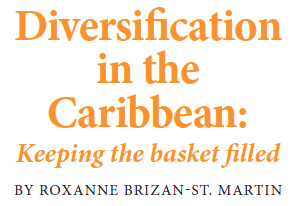|
September 2016

Issue Home >>
|


Diversification, which means having multiple and unrelated sources of income for one’s economy that is viewed as a means of increasing productivity and achieving sustainable development. Economists believe that a diversified economy, during volatile economic conditions allows one industry to be more competitive when another might be stressed. The performing industries can keep the economy relatively healthy and export markets can be kept competitive. Despite these advantages, diversification of Caribbean economies has been particularly difficult given their traditional agricultural-based-mono-crop nature, small size, lack of output and export diversification and the difficulties of shifting resources from one sector to another.
While countries such as Barbados, Jamaica and Trinidad have achieved some level of success in economic diversification, particularly as it relates to Information Communication and Technology (ICTs), financial services sector and marketing, the economies of many other Caribbean countries remain relatively undiversified. Although Trinidad and Tobago has been identified as having one of the most diversified and advanced production structures in the Caribbean region, this economy has recently faced many challenges amidst falling oil price bringing to fore the timeliness of the diversification dialogue. Additionally, it is believed that Caribbean countries with dependency on service exports (tourism) are more resilient to changing economic conditions and less volatile than goods export.
However, volatile economic conditions such as recessions and the changing global economy can create incentives for Caribbean countries to adopt a more proactive approach to diversification and in so doing strengthen their economies. Economists recommend that for Caribbean economies to achieve a diversified economic structure of production there is the need to develop new products and services, attracting foreign direct investment and seeking more export markets for the same product. Initiatives such as CSME can be capitalised to achieve these.
While there are many advantages of having diversified economies and there is the awareness of the benefits of a well-diversified economy in the context of the Caribbean, there is the need to question the appropriateness of models of diversification for Caribbean economies and the ways in which diversification is facilitated. The literature points to an advantage of diversification as being its ability to encourage the development of new sectors of the economy. As such, the annual Conference of the Economy (COTE) presentations will be organised along the following five sub-themes exploring possibilities for diversification in Trinidad and Tobago and the wider Caribbean in these sectors:
- Education and Human Resource Development
- The Energy Sector and Diversification
- Trade and Development
- Agriculture Sector Development
- Services Sector including Financial Services
 COTE is organised every year by the Department of Economics and is on this year between October 13 and 14 at The UWI, St. Augustine Campus. The conference this year honours former Head of Department and Senior Lecturer Mr Martin Franklin, and will explore the theme Managing Development in a Volatile Economic Environment: Addressing Diversification Challenges. COTE is organised every year by the Department of Economics and is on this year between October 13 and 14 at The UWI, St. Augustine Campus. The conference this year honours former Head of Department and Senior Lecturer Mr Martin Franklin, and will explore the theme Managing Development in a Volatile Economic Environment: Addressing Diversification Challenges.
Roxanne Brizan- St. Martin is an Instructor with the Department of Economics, The University of the West Indies, St Augustine Campus. |





